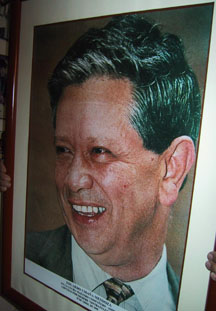18th April marks the fourth anniversary of the assassination of Eduardo UmaÒa Mendoza, one of the bravest and most influential Colombians of modern times. 
Eduardo was a campaigning human rights lawyer who combined rigorous commitment to scientific method with respect for people in struggle. He was enormously admired, his funeral occasioned a national stoppage, and his inspiration is still cherished in the mass movement. The themes that he was focussing on at the time of his death are still dominant issues, they can be seen for example in the work of our solidarity campaign: the criminality of the state, the fight against impunity, and the criminalisation of social protest against the multinationalsí takeover of Colombiaís resources.
Eduardo wrote ‘To The Workers of the World’ in February 1998, just two months before his death. It is a searing indightment of the repression faced by the oilworkers union USO in which Umaña showed how military intelligence interfered in the system of Îjustice without a faceí, the juryless courts used to incarcerate political opponents featuring testminonies from informants and absurd judicial decisions.
In his last few months Eduardo was also working feverishly to help the telecommunications workers union to expose the corruption involved in privatisation of their sector, a story which is still unfolding.
From a statement issued by Colombian human rights and social organisations at the time:
‘On this day, 18th April 1998, in his home in the district of Nicolas de Federman, to the north-west of Bogot·, Eduardo Umaña Mendoza, the criminal lawyer and human rights defender was killed in a vile and cowardly manner, with two shots in the head, by several armed individuals dressed in civilian clothes who broke the security of the residential block and got into his flat….
‘The violent death of Eduardo Umaña Mendoza is part of a wave of persecutions, attacks, disappearances and assassinations of human rights defenders – some very well known, others anonymous – that has been going on in our country for more than a decade and has intensified in the last three years. This mournful fact occurs in the contaxt of a generalised climate of hostility to defenders of human rights, tolerated for several years by successive governments, which have insisted on accusing human rights defenders as enemies of state institutions and allies or spokespeople for the guerrilla groups. A climate in which functionaries of the military or security organs of the State, or members of paramilitary groups, feel that it is a good thing or a patriotic thing, rather than a treacherous and cowardly crime, if they take the life of a human rights defender…
‘Eduardo Umaña Mendoza was from the beginning of the 1970s an unselfish fighter for human rights. He dedicated his efforts, his intelligence and his passion to an intransigent defence of the weakest and those persecuted for political reasons, through the exercise of his profession as a lawyer, with his capacities for investigation, for criticism, for polemic and for public denunciation of grave violations of human rights. In 1977 he was an active founding member of the Committee for Solidarity with Political Prisoners and in 1978, together with other professional human rights workers, he founded the Lawyers Collective ‘JosÈ Alvera Restrepoí, in which he particpated until 1994. From then he continued with his brilliant work from a corner of his home, until the assassins cowardly entered to take his life…’

